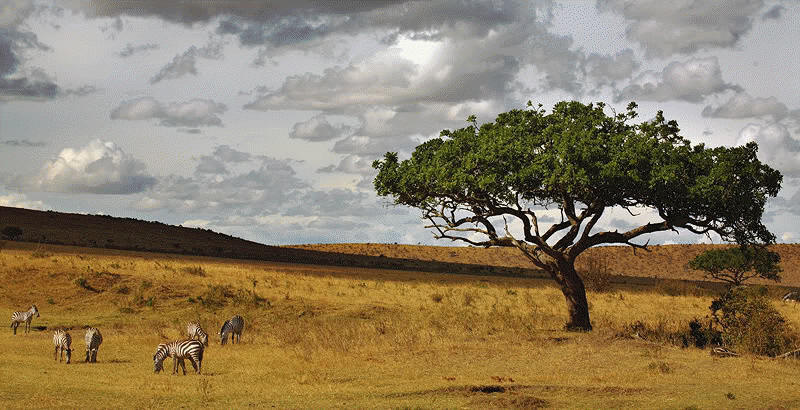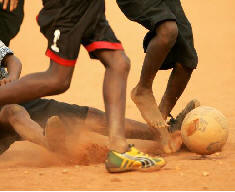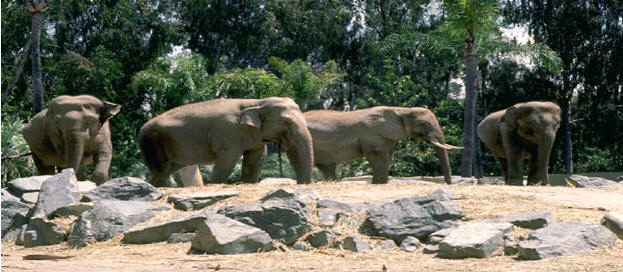L a G r a n E n c i c l o p e d i a I l u s t r a d a d e l P r o y e c t o S a l ó n H o g a r
![]()
Chapter 4: Safari Continent
Read the passage. Then answer questions about the passage below.

Proyecto Salón Hogar
|
Africa is the second–largest continent after Asia. It also has the second–largest population after Asia. About one billion people live in Africa. That is almost 15% of the world’s population. There are currently 54 countries on the continent of Africa, when including island countries and the Western Sahara. The number of countries sometimes changes because many of the countries were made by colonial powers. Colonial powers are countries that made colonies in Africa when it was first being discovered by outsiders. There are about 2,000 different languages in Africa. Most of the languages belong to one of four large language groups. The four large language groups are Afro-Asiatic, Nilo-Saharan, Niger-Congo, and the Khoisan languages. People also speak some non–African languages in Africa. About 20% of the population speak Arabic, mostly in northern Africa. About 10% speak Swahili, mostly in southeastern Africa. About 5% speak Hausa, mostly in western Africa. Many people also speak English, French, and Portuguese. One African country, Nigeria, has 250 different languages! There are many different tribes and cultures in Africa. For example, there is the Ashanti people. They live in Ghana. They are famous for their beautiful Kente cloth. Kente cloth can be different colors.
|
Page 1
![]()
|
Ashanti people wear clothing made of Kente cloth for important events. There are also the Madinka people. They live in West Africa - mostly in Senegal, Gambia, and Guinea-Bissau. Some Madinka people also live in Burkina Faso, Mali, and Cote d'Ivoire. The Madinka people are famous for their music. They tell their history with music. Most scientists think that the first humans came from Africa. The first written information in Africa comes from Egypt at around 3300 B.C.E. (B.C.E. means Before the Common Era., or before the year “0”). Egypt is one of the oldest African civilizations. At that time, Egypt traded with Phoenicia, which is now Lebanon, and includes parts of Israel, Palestine, and Syria. Egypt was discovered by the ancient Greeks, who were the first Europeans to go to Africa. In the late 1800s, European countries went to Africa. France, Britain, Portugal, Germany, Belgium, Spain, Italy, and Algeria made colonies in Africa. That means they controlled the governments there. The European powers took land by force. This enabled them to send many raw materials home to their countries. Raw materials are resources that are basic, and have not been made into anything else. Many African countries became free after World War II. Some countries became free in a peaceful way. Some countries had to fight to be free. The time after colonial rule is commonly referred to as “post–colonial Africa.” Post–colonial Africa has had some very big problems. After the colonial powers left, there were problems with government. Between 1960 and 1980, there were 70 coups. (pronounced “koo”) A coup is the overthrow of a government. There were 13 presidential assassinations. That means 13 African presidents were murdered. In the 1970s, there was a huge famine in Ethiopia. A famine is a time of little or no food. Hundreds of thousands of people died of starvation, which means they died of hunger. There have been wars. There has been a big conflict in Dafur, Sudan, and many people have died. And the AIDS (Acquired Immunodeficiency Syndrome) disease has caused much sickness and death in post–colonial Africa. Africa has many natural resources. There are eight oil exporting countries in Sub–Saharan Africa. They are Nigeria, Angola, Congo-Brazzaville, Gabon, Equatorial Guinea, Cameroon, Chad, the Democratic Republic of Congo (DRC), and Sudan. Africa has about 7% of the oil reserves in the world. South Africa is the largest gold producer in the world.
|
Page 2
![]()
|
Ghana, Mali, Sierra Leone, Tanzania, Rwanda and the DRC also have a lot of gold. The DRC has copper and cobalt. The DRC produces 22% of world’s diamonds every year. Botswana, Sierra Leone, and South Africa also have a lot of diamonds. Mozambique, Cameroon, Equatorial Guinea, Gabon, Ghana, and Liberia all have a lot of timber, which is wood. The business in gas, oil diamonds, timber and tourism is very good. People visit Africa because the landscape is beautiful and there are many animals in Africa. Many tourists visit Kruger National Park in South Africa. The park has 517 species of birds! The park also has 147 species of mammals! The park even has webcams so people can watch the animals using their computer. Some tourists go on safari in Africa. The word “safari” is a Swahili word. It comes from the Arabic word safiara, which means travel. It is a trip where people can watch and take pictures of animals. Sometimes it is a hunting trip.
Most modern safaris are trips to look at animals. Some safari trips are in cars or trucks, helicopters or air balloons. This way, people can watch the animals from a safe place.
Soccer is the most popular sport in Africa. The Confederation of African Football (CAF) is the organization in charge of soccer. The first members of the organization were Egypt, Sudan, Ethiopia, and South Africa. The CAF is the biggest of the six continental soccer associations around the globe, and the African Cup of Nations is the main contest for men’s national soccer teams in Africa. The continent of Africa is rich with resources, people and culture. Unfortunately, this has contributed to its chaotic history. Africa is currently working on increasing education and jobs. Many organizations are working together to build schools, hospitals, and industry to improve the future of the African nation.
|
Page 3
![]()
|
Questions
1) How many large language groups are there in Africa? __ A. 4
__ C. 25 __ D. 2,50 __ E. 2,500
2) Where does Kente cloth come from? __ A. Mali __ B. Ghana __ C. Gambia __ D. Senegal __ E. Nigeria
3) Which country had colonies in Africa? __ A. Germany __ B. France __ C. Britain __ D. Portugal __ E. Both A and B are correct __ F. All of the above
4) How many different kinds of birds can you see at Kruger National Park? __ A. 13 __ B. 70 __ C. 147 __ D. 517 __ E. 1,250
|
|||||
|
Page 4
Page 5
|
|||||
|
5) A safari is a… __ A. trip. __ B. tour. __ C. search. __ D. Both A and C are correct. __ E. All of the above
6) If something is chaotic, it is… __ A. carefully organized. __ B. sick and diseased. __ C. crazy and demented. __ D. turbulent and disorderly. __ E. evil and maligned.
Grammar: Possessive Nouns A possessive noun shows that a person or thing owns or possesses something.
Add an apostrophe (') and an s to a singular noun to make it possessive. Examples: Liza's bag, Frances's book
Add an apostrophe (') to a plural noun that ends with an s to make it possessive. Example: the children's toys
Add an apostrophe (') and an s to form the possessive of a plural noun that doesn’t end with an s. Example: the students' classroom
A. Put the apostrophes where needed in the following sentences. 1. We dislike our brothers-in-law. 2. Michaels job is to wash the dirty clothes. 3. Roberts job is to help tape the boxes. 4. The students reports sounded beautiful. 5. Aunt Marys flight arrived late. 6. Dads red mug is a keepsake. 7. The teachers association meets Wednesday. |
|||||
|
Page 6
|
|||||
|
|
B. Rewrite the sentence fragments using possessive nouns.
1. the toy of the boy __________________________________________________________________________________________
2. the pen that belongs to Sam __________________________________________________________________________________________
3. the car of the family __________________________________________________________________________________________
A. Circle the subject and underline the predicate in each of the following sentences. 1. Billy goes to school every day. 2. The movie theater is in downtown. 3. The dog is thirsty. 4. The bus stops next to the train station. 5. Henry has a large backpack. 6. Dad treasures his blue car.
B. Circle the singular nouns. Cross out the plural nouns. women cities town aunt cake children planes boxes farm dishes bean kid city tears cousins families uncle cars
|
||||
| Page 7
|
|||||
|
|
C. Write the possessive nouns in the following sentences. ______________ 1. Richards's choice for dinner is a can of spinach. ______________ 2. Bobby's phone is neat! ______________ 3. Mom's job is cleaning at a large cottage. ______________ 4. Our cousin's car is in the garage. ______________ 5. The neighbor's chicken farm is very small. ______________ 6. The students' classroom is very dark.
D. Write a paragraph about your relationship with your family. Underline the subject of each of the sentences once and the predicate twice. Circle the nouns and classify them as singular, plural, or possessive.
______________________________________________________________________ ______________________________________________________________________ ______________________________________________________________________ ______________________________________________________________________ ______________________________________________________________________ ______________________________________________________________________
|
||||
| Page 8
|
|||||
|
|
Writing: Paraphrasing Paraphrasing is a writing process in which we rewrite information from a source in our own words. It is the process of rewording, rephrasing, or restating information provided by a story, an essay, an article, or any other publication. This process exercises our creativity with thoughts and words. Sometimes, copying a text word by word may seem easy and quick. However, paraphrasing allows us to reflect on and analyze the information to make it our own. It also allows you to add new information and criticize it constructively.
Example: Original: Mom does not like the idea of Mike and Janice being alone without an adult, and that in large part is why she has invited Uncle Lou to come for a visit. Paraphrase: Mike and Janice's mother do not want to leave her children alone. She thinks that they should stay with a responsible adult to take care of them. Because of this, she invited their Uncle Lou, to help them.
Reread the story "Safari Continent." Choose one sentence from the story and paraphrase it. Original: ___________________________________________________________________________________ __________________________________________________________________________________________ Paraphrase: ________________________________________________________________________________ __________________________________________________________________________________________
Drafting Read the following text from the story "Safari Continent," and paraphrase it.
People visit Africa because the landscape is beautiful and there are many animals in Africa. Many tourists visit Kruger National Park in South Africa. The park has 517 species of birds! The park also has 147 species of mammals! The park even has webcams so people can watch the animals using their computer. Some tourists go on safari in Africa. __________________________________________________________________________________________ __________________________________________________________________________________________ __________________________________________________________________________________________ __________________________________________________________________________________________ __________________________________________________________________________________________
Editing Reread what you wrote. Make sure that your rewriting is satisfactory and that it expresses what you wish to say. If there are any errors, correct them. Make sure that each sentence begins with a capital letter and ends with a period. You may also change anything you wish, like words or opinions. __________________________________________________________________________________________ __________________________________________________________________________________________ __________________________________________________________________________________________ __________________________________________________________________________________________ __________________________________________________________________________________________
Proofreading Write a final version of what you wrote. Reread it to make sure that all of the necessary corrections were made. __________________________________________________________________________________________ __________________________________________________________________________________________ __________________________________________________________________________________________ __________________________________________________________________________________________ __________________________________________________________________________________________
|
||||
| Page 9
|
|||||
|
Publishing
Review A. Mark the sentences that best explain what a story is. __ 1. A story is a brief fictional narrative written in prose. __ 2. Stories provide definitions of very specific concepts. __ 3. Stories always have a plot and a beginning, middle, and end. __ 4. Stories have rhythm and rhyme.
B. Write sentences that correspond to each kind of point of view. 1. First person ______________________________________________________________________________ __________________________________________________________________________________________
2. Second person ___________________________________________________________________________ __________________________________________________________________________________________
3. Third person, limited ________________________________________________________________________ __________________________________________________________________________________________
4. Third person, omniscient ____________________________________________________________________ __________________________________________________________________________________________
C. Mark the narrator's point of view in the story "Safari Continent" Explain your choice. __ 1. first person __ 2. third person, limited __ 3. second person __ 4. third person, omniscient
Explain: ___________________________________________________________________________________ __________________________________________________________________________________________
D. Complete the word series. Circle the synonyms and underline the antonyms. 1. dark, bright; night, __________ 2. gigantic, huge, large, __________ 3. tiny, small; short, __________ 4. tall, short; big, __________ 5. laugh, cry; happy, __________ 6. obscure, somber, black, __________ 7. old, young; adult, __________ 8. excited, cheerful, joyful, __________
|
|||||
|
Page 10
|
|||||




 __ B. 8
__ B. 8
